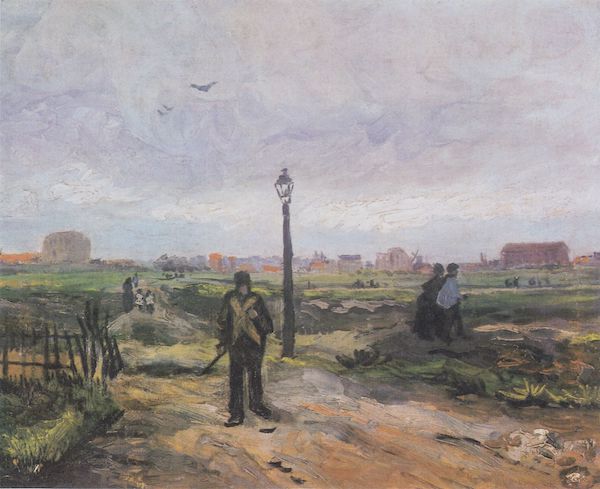
Vincent van Gogh On the outskirts of Paris 1887

Roaches in a nuclear winter.
• Global Insect Decline May See ‘Plague Of Pests’ (BBC)
A scientific review of insect numbers suggests that 40% of species are undergoing “dramatic rates of decline” around the world. The study says that bees, ants and beetles are disappearing eight times faster than mammals, birds or reptiles. But researchers say that some species, such as houseflies and cockroaches, are likely to boom. The general insect decline is being caused by intensive agriculture, pesticides and climate change. Insects make up the majority of creatures that live on land, and provide key benefits to many other species, including humans. They provide food for birds, bats and small mammals; they pollinate around 75% of the crops in the world; they replenish soils and keep pest numbers in check.
Many other studies in recent years have shown that individual species of insects, such as bees, have suffered huge declines, particularly in developed economies. But this new paper takes a broader look. Published in the journal Biological Conservation, it reviews 73 existing studies from around the world published over the past 13 years. The researchers found that declines in almost all regions may lead to the extinction of 40% of insects over the next few decades. One-third of insect species are classed as Endangered. “The main factor is the loss of habitat, due to agricultural practices, urbanisation and deforestation,” lead author Dr Francisco Sánchez-Bayo, from the University of Sydney, told BBC News.
“Second is the increasing use of fertilisers and pesticides in agriculture worldwide and contamination with chemical pollutants of all kinds. Thirdly, we have biological factors, such as invasive species and pathogens; and fourthly, we have climate change, particularly in tropical areas where it is known to have a big impact.” [..] “Fast-breeding pest insects will probably thrive because of the warmer conditions, because many of their natural enemies, which breed more slowly, will disappear,” said Prof Dave Goulson from the University of Sussex who was not involved in the review. “It’s quite plausible that we might end up with plagues of small numbers of pest insects, but we will lose all the wonderful ones that we want, like bees and hoverflies and butterflies and dung beetles that do a great job of disposing of animal waste.” Prof Goulson said that some tough, adaptable, generalist species – like houseflies and cockroaches – seem to be able to live comfortably in a human-made environment and have evolved resistance to pesticides.

Nobody listened so far; why would they now?
• Complex, Dynamic Environmental Destabilisation (BBC)
• Topsoil is being lost 10 to 40 times faster than it is being replenished by natural processes • Since the mid-20th Century, 30% of the world’s arable land has become unproductive due to erosion • 95% of the Earth’s land areas could become degraded by 2050 • Since 2005, the number of floods has increased by a factor of 15, extreme temperature events by a factor of 20, and wildfires sevenfold • Vertebrate populations have fallen by an average of 60% since the 1970s, and insect numbers – vital for pollination – have declined even faster in some countries.
Scientists warn of a potentially deadly combination of factors. These include climate change, mass loss of species, topsoil erosion, forest felling and acidifying oceans. The report from the centre-left Institute for Public Policy Research says these factors are “driving a complex, dynamic process of environmental destabilisation that has reached critical levels. “This destabilisation is occurring at speeds unprecedented in human history and, in some cases, over billions of years.” The UK is described as one of the most nature-depleted countries in the world. Some 2.2 million tonnes of UK topsoil is eroded annually, and over 17% of arable land shows signs of erosion. Nearly 85% of fertile peat topsoil in East Anglia has been lost since 1850, with the remainder at risk of being lost over next 30–60 years. The IIPR says many scientists believe we have entered a new era of rapid environmental change.
The report warns: “We define this as the ‘age of environmental breakdown’ to better highlight the severity of the scale, pace and implications of environmental destabilisation resulting from aggregate human activity.” Simon Lewis, Professor of Global Change Science at University College London, told BBC News: “IPPR are right to say that environmental change is happening ever-faster and threatens to destabilise society. “Future problems with food supplies could cause price spikes that drive civil unrest, while increases in levels of migration can strain societies. “Both together could overload political institutions and global networks of trade. “This century will be marked by rapid social and environmental change – that is certain. What is less clear is if societies can make wise political choices to avoid disaster in the future.”
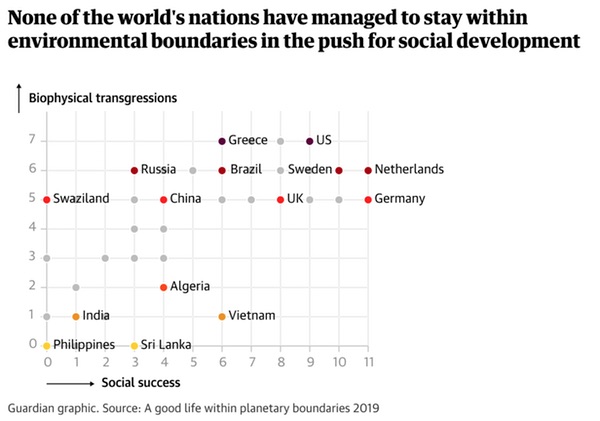

Written of course by a politician. Who thinks politicians can turn this around. Because they can do anything.
• Politicians Are Complicit In The Killing Of Our Insects (G.)
Most of us spend more time swatting away or avoiding wasps and moths than we do contemplating their importance to the web of life. But it is no exaggeration to say that the horrifying decline in the number of these creatures – the most widespread on Earth – is a barometer for the whole planet. The new global scientific review into the perilous condition of our insects reports that more than 40% of insect species are threatened with extinction while the mass of insects is declining by 2.5% a year. This catastrophic decline is a direct cause of the existential threat to other animals, insects being at the bottom of the chain and the primary food source. Since 1970, 60% of mammals, birds, fish and reptiles have been wiped out.
The review identifies a key driver towards this mass extinction: habitat loss and conversion to intensive agriculture with its associated use of pesticides. Given this is a manmade disaster, surely we are capable of tackling and reversing it? As a member of the European parliament’s agriculture committee, I regularly debate the use of pesticides in farming with my colleagues. I have lost count of the number of times I have begun meetings with what feels like a sermon on the Armageddon taking place in our countryside. I am always greeted with patient, patronising smiles from many of my fellow MEPs, before they go on to ignore the warnings and refuse to limit the use of pesticides in our fields.
Some of the members of this committee are themselves farmers who have grown increasingly dependent on powerful and toxic pesticides. But others have taken the agribusiness shilling and believe that their role in policymaking is simply to support the corporations that sell these poisons. And this is the nub of the issue. What might accurately be dubbed insectageddon is being driven by the agrichemicals industry. This situation is compounded by compliant politicians and policymakers who fall prey to lobbying pressure and then refuse to implement science-driven policy to protect wildlife.

What we should do is end the Fed. And replace it with markets.
• Should We Really Not Worry About The Fed’s Balance Sheet? (Roberts)
Bill Dudley, who is now a senior research scholar at Princeton University’s Center for Economic Policy Studies and previously served as president of the New York Fed and was vice-chairman of the Federal Open Market Committee, recently penned an interesting piece from Bloomberg stating: “Financial types have long had a preoccupation: What will the Federal Reserve do with all the fixed income securities it purchased to help the U.S. economy recover from the last recession? The Fed’s efforts to shrink its holdings have been blamed for various ills, including December’s stock-market swoon. And any new nuance of policy — such as last week’s statement on “balance sheet normalization” — is seen as a really big deal. I’m amazed and baffled by this. It gets much more attention than it deserves.”
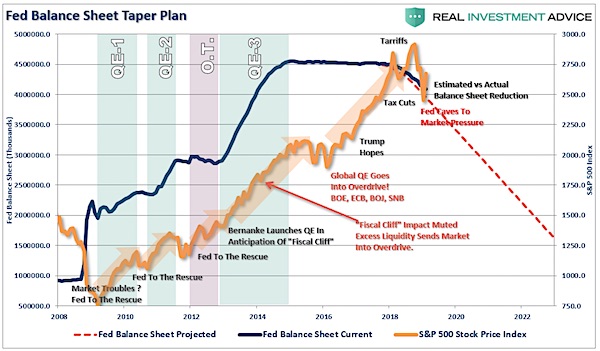
[..] In his opening paragraph, Bill attempts to dismiss the linkage between the balance sheet and the financial markets. “Yes, it’s true that stock prices declined at a time when the Fed was allowing its holdings of Treasury and mortgage-backed securities to run off at a rate of up to $50 billion a month. But the balance sheet contraction had been underway for more than a year, without any modifications or mid-course corrections. Thus, this should have been fully discounted.” While this is a true statement, what Bill forgot to mention was that Global Central banks had stepped in to flood the system with liquidity. As you can see in the chart below, while the Fed had stopped expanding their balance sheet, everyone else went into over-drive.
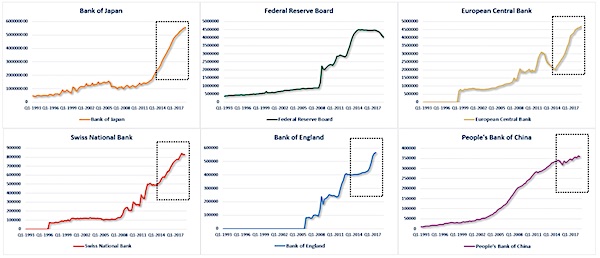
The chart below shows the ECB’s balance sheet and trajectory. Yes, they are slowing “QE” but it is still growing currently.
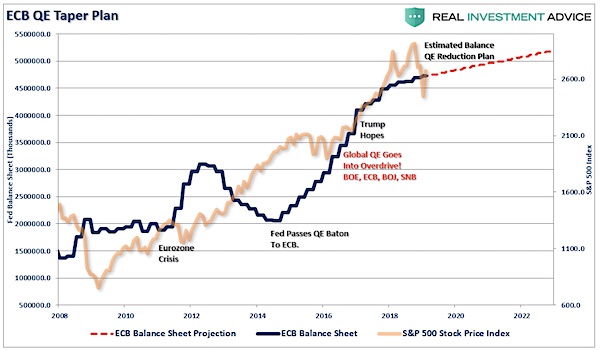

Far from over.
• Party Leaders Reach Deal To Avoid Fresh US Government Shutdown (AP)
Democratic and Republican leaders announced late Monday that they had reached a deal to avoid a government shutdown when funding under a stopgap agreement expires at midnight on Friday. The proposal would require the signature of Donald Trump to avert a new shutdown. The agreement would allocate far less money for Trump’s border wall than the White House’s $5.7bn wish list, settling for a figure of nearly $1.4bn, according to congressional aides. The funding measure is through the fiscal year, which ends 30 September. The agreement means 55 miles of new fencing — constructed through existing designs such as metal slats instead of a concrete wall — but far less than the 215 miles the White House demanded in December. The fencing would be built in the Rio Grande Valley in Texas.
At a rally in El Paso, Texas, on Monday Trump said he had been informed about the committee’s progress. “Just so you know, we’re building the wall anyway”, he added. Negotiators have been trying to reach a deal to fund nine government departments that partially closed for 35 days in December and January. Trump and congressional Democrats agreed on 25 January to temporarily fund the departments and negotiate a funding solution by 8 February. Talks most recently broke down on Sunday, reportedly over a disagreement about the maximum number of undocumented immigrants who might be detained at any one time.

Warren is irrelevant.
• Warren’s Foreign Policy Shows She’s Missing Why Trump Was Elected (G.)
The United States, Warren says, has embarked on “a series of seemingly endless wars, engaging in conflicts with mistaken or uncertain objectives and no obvious path to completion”. It’s fine rhetoric but the obvious path to completion is merely to end the wars. And yet the Bush White House couldn’t or didn’t want to. And Obama vacillated and expanded to the point where bombing and killing was being pursued in almost a dozen countries when he left office. And as for Trump? He’s done little and he’s been publicly admonished by his own secretary of defense when he decided he wanted to end just one of those conflicts.
But “the United States”? Really? Other than Afghanistan after 9/11 – and that’s all – “the United States” didn’t embark on these wars. The national security community did. The government. Overtly, covertly, with high hopes or unwarranted self-confidence, they got their way. Who is the real culprit then? It isn’t Warren’s “elites”, the corporation, or Trump. It is Washington and its ability, indeed even its self-appointed duty, to stand in the way of anything that it sees as not in its interest.
She may not think it, but Warren is merely genuflecting before this deep state, declaring her allegiance to a “muscular military” and calling for “strong yet pragmatic security policies”. She of course offers a laundry list of things that must be preserved or strengthened that’s non-military – from technological superiority to diplomacy to strong alliances. And she decries the military and civilian policymakers who “seem [in]capable of defining success”. But in her innocence as to why we are stuck in seemingly endless wars she also seems oblivious to the fact that she is already capitulating to the very forces that ensure that we can’t change anything.

Will the Green New Deal Make America Great Again?
The self-proclaimed socialists are actually seeing the world through a rear-view mirror. What they are really talking about is divvying up the previously-accumulated wealth, soon to be bygone. Entropy is having its wicked way with that wealth, first by transmogrifying it into ever more abstract forms, and then by dissipating it as waste all over the planet. In short, the next time socialism is enlisted as a tool for redistributing wealth, we will make the unhappy discovery that most of that wealth is gone. The process will be uncomfortably sharp and disorientating. The West especially will not know what hit it as it emergently self-reorganizes back into something that resembles the old-time feudalism.
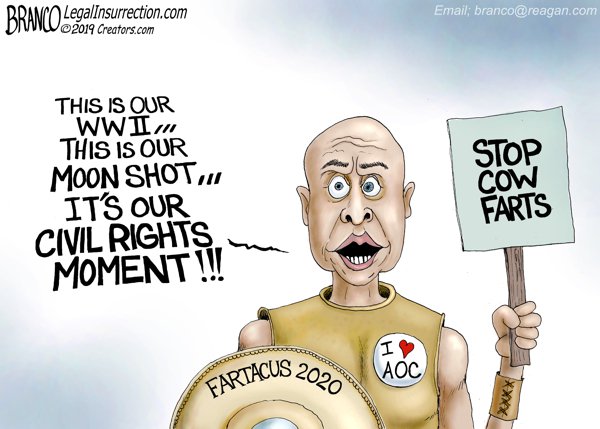
We have a new kind of mass squalor in America: a great many people who have nothing to do, no means of support, and the flimsiest notions of purpose in life. The socialists have no answers for them. They will not be “retrained” in some imagined federal crusade to turn meth freaks into code-writers for Google. Something the analysts are calling “recession” is ploughing across the landscape like one of those darkly majestic dust-storms of the 1930s, only this time we won’t be able to re-fight anything like World War Two to get all the machines running again in the aftermath. Nor, of course, will the Make America Great Again fantasy work out for those waiting in the squalid ruins of the post-industrial rust-belt or the strip-mall wastelands of the Sunbelt.
Most of the beliefs and attitudes of the present day will be overturned with the demise of the industrial orgy, like the idea that humanity follows an unerring arc of progress, that men and women are interchangeable and can do exactly the same work, that society should not be hierarchical, that technology will rescue us, and that we can organize some political work-arounds to avoid the pain of universal contraction. There are no coherent ideas in the political arena just now. Our prospects are really too alarming. So, jump on-board the socialism ship and see if it makes you feel better to sail to the end of the earth. But mind the gap at the very edge. It’s a doozie.

And 2 more weeks after that etc. till the clock runs out.
• May To Ask MPs For Further Fortnight’s Grace In Brexit Talks (G.)
Theresa May hopes to convince the House of Commons on Tuesday to give her another fortnight’s grace to keep pushing for changes to the Irish backstop – despite the insistence of Michel Barnier that it is Britain that must compromise. With 45 days to go until Britain is due by law to leave the EU, with or without a deal, the prime minister will address MPs about progress in the Brexit talks, No 10 announced on Monday. She is unlikely to signal any shift towards a closer future relationship with the EU, after writing to Jeremy Corbyn to underline her continued objections to a customs union, and instead she will focus on the backstop.
“We are absolutely clear on this: we’re not considering Jeremy Corbyn’s customs proposals, we’re not considering any proposals to remain in the customs union. We must have our own, independent trade policy,” May’s spokesman said on Monday. May will stress her continued focus on the backstop, but the EU’s chief negotiator insisted on Monday there was no question of Brussels giving in to Downing Street’s demands. “We’re waiting for clarity and movement from the United Kingdom,” Barnier told reporters after talks in Luxembourg with the country’s prime minister, Xavier Bettel.
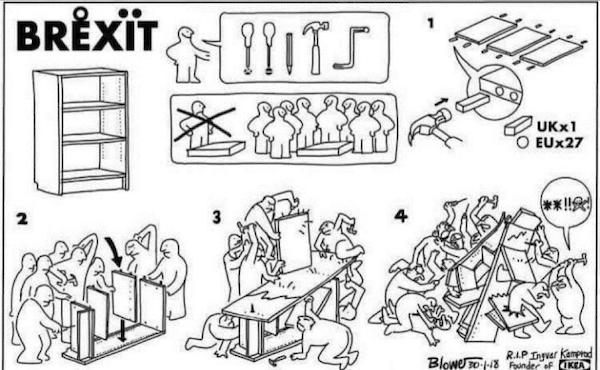

The EU has the exact same flaws as its member states, but in the latter the losers can get voted out.
• Europeans Must Get Rid Of The Failing EU One Way Or Another (MW)
Populism is sweeping Europe, because the European Union and its constituent governments have become as unresponsive as the 18th century aristocracies those replaced.The EU antecedent, the European Economic Community (1957) was created to prevent another World War by integrating the continent’s iron and steel industries and then its broader continental markets for goods, services, capital and labor. The process created a politically unaccountable bureaucracy, whose broad policy directions are set by consensus among the national heads of government and cabinet ministers. However, Brussels enjoys wide administrative discretion in supervising the customs union, agricultural and fisheries management, and national subsidies, anticompetitive practices, and other behavior that could undermine the “single market.”
Through a succession of treaties and agreements, national leaders “pooled sovereignty” to empower the European Commission to issue edicts that member states must directly obey or conform national laws and regulations in areas such as social policy and human rights, consumer protection and product standards, transportation, and immigration. European Court rulings have direct application in national courts, and 19 of the 28 states have ceded monetary policy to the European Central Bank by adopting the euro. To win votes, mainstream national politicians have endemically statist impulses, and hue to globalist views regarding the virtues of freer trade and more open immigration, regulatory responses to environmental challenges like climate change rather than mitigation, and impelling cultural diversity as opposed to preserving local cultures.
In Europe, national leaders have empowered the commission to impose the pain and constraints on private freedoms that such globalist policies require. Then they can point to Brussels to alibi they are just advancing a stronger European Union.

Deutsche is a wager gone horribly wrong.
• “Insane” Deutsche Bank Drowning Under Soaring Funding Costs (ZH)
Following years of dismal performance, uncovered attempts at market manipulation and fraudulent activities, and painful corporate reorganizations which its latest earnings report showed have “cut deeply into the muscle”, Deutsche Bank is a shadow of its former self, with its stock price trading just shy of all time lows. But an even bigger problem for Germany’s biggest lender is that it is now forced to pay the highest financing rates on the euro debt market for a leading international bank this year according to the FT, and also the highest rates among large banks to raise debt this year according to Bloomberg, in a further sign of the German lender’s uphill struggle to turn its operations around and reduce its funding costs.
As the FT first reported, followed promptly by Bloomberg, the bank raised eyebrows last week when it sold a total of €3.6BN in euro-denominated debt, paying 180 bps over the benchmarks for a two-year bond, a steep rate for short-term funding. Deutsche Bank also paid 230 bps over benchmarks for a senior seven-year bond that can absorb losses in a crisis. By comparison, French banking giant BNP Paribas SA last month offered 50 bps less for equally-ranked notes that mature one year later. More embarrassing, Deutsche Bank paid a higher rate than Spanish lender CaixaBank, which recently raised five-year bonds at 225bp.
In a latest note to clients, Corinna Dröse, a Frankfurt-based bond analyst at DZ Bank, said: “The high spreads reflect [Deutsche’s] high idiosyncratic risk, which is rooted in the lender’s chronic weakness in earnings.” “Deutsche has to pay significantly higher risk premiums than almost all other large European banks . . . [the] high spreads express severe doubts, mainly triggered by its poor revenue,” said Michael Hünseler, head of credit portfolio management at Assenagon. Intimately linked with the bank’s deteriorating fortunes – and stock price – investors are increasingly demanding that Deutsche Bank pay higher rates of return than even some of Europe’s “most troubled banks” as the firm grapples with a prolonged decline in revenue.
Finance chief James von Moltke said last year that the bank was caught in a “vicious circle” of declining revenue, sticky expenses, a lowered credit rating and rising funding costs. While the firm cut expenses, revenue and the price of funding remain a concern. “A key priority for us now is lowering our funding costs and improving our credit ratings,” von Moltke said during a call with fixed-income investors last week. “We must not compromise on the strength of our capital, funding, or liquidity, but we have to prove that we can generate long-term, sustainable profitability.”

It’s not about eating meat, it’s about industrial farming. All these scientists telling people what to eat are useless.
• Nearly A Fifth Of The EU’s Budget Goes On Livestock Farming (G.)
Nearly a fifth of the EU’s total budget – more than £24bn of taxpayer money – goes to support livestock farming across Europe, according to new research by Greenpeace. At a time when scientists are calling for significant reductions in meat consumption, the report’s authors say taxpayers’ money should be redirected away from grain-fed, industrial animal farming. Last month, the Eat-Lancet Commission of scientists called for a new plant-focused diet to help avoid dangerous levels of climate change and the destruction of wildlife. Such a diet would require cutting red meat consumption in Europe by 77%.
Public Health England’s dietary guidelines recommend that meat and dairy, including non-animal-based protein alternatives such as beans and pulses, should make up no more than our 20% of dietary intake. Yet, Europeans eat more than twice as much meat as national dietary authorities recommend, as well as twice the global average. “Adopting diets lower in meat and dairy would not only tackle health problems but would also reduce the pressure on land, freeing up more space for nature,” said the Greenpeace EU agriculture policy director Marco Contiero. [..] Researchers calculated that 125 million hectares (308 million acres) of land in Europe is used to graze livestock or produce feed – this includes more than 60% of arable land that could otherwise be used to grow food directly for human consumption.

China has no idea what democracy is. But it has a ruling class just like our countries.
• China Has No Use For Democracy. It Needs A Strong Leader Like Xi (SCMP)
Throughout my life, I have had the opportunity to meet nearly every Chinese leader since the 1930s (with the exception of Mao Zedong), including Chiang Kai-shek, Wang Jingwei and more contemporary figures such as Hu Jintao, Jiang Zemin and Xi. As individuals, they frequently came off as kind, caring and intelligent. From afar, as I watched them govern, I would view them in a different light, as dictators. This is the reality of leadership in China. Previously, emperors in China were said to rule because of their “Mandate of Heaven”. When Mao seized power, it was clear that he had won his position through revolution. Yet the selection of Xi, like the selection of his predecessors since Mao’s death in 1976, is cloaked in secrecy.
Even those in the US who question whether, and to what degree, Russian interference influenced the 2016 election will concede that, based on US law, Trump is a legally elected president. These results are publicly available, and have been analysed repeatedly by the media, politicians and the American public. But China lacks such luxuries. Its citizens have no official records to turn to for an explanation of why and how Xi was chosen. [..] Under Xi’s leadership, China has adopted a more aggressive stance internationally, imprisoned thousands of party members on corruption charges and removed constitutional limitations on presidential term limits. Amid these developments, the question of how Xi was chosen again comes to mind. The short answer is, we can only guess.

Why, why and why?
• History’s 10 Most Culturally Significant Dick Pic Scandals (Taibbi)
The AMI-Jeff Bezos scandal is set up to dominate headlines for a while. Who knows where it will lead? In the third world, an oligarch-president proxy war playing out in public like this usually presages a coup. If this were Thailand or Uruguay, bookies would already have odds on a Bezos-Mark-Zuckerberg-Sundar-Pichai junta being in power by May. This scandal will at least drag us through unprecedented legal and ethical conundrums. Can the president use the surveillance powers of the state to go after political enemies? Can a billionaire intelligence contractor and administrator of one of earth’s largest private data collections — including the so-called “Secret Region” cloud — fight back using his own surveillance trove through a newspaper he owns?
This story could blur the lines between public and private power to the point of meaninglessness. America could very well find its fate decided by a series of pre-dawn phone calls, after which we’d wake up to find Trump flying to Switzerland, Amazon lieutenants in the Joint Chiefs office and the presidency replaced by an executive board. At the center of all of this: a dick pic. Nothing could be more American than the fate of our democracy now hanging (!) on what Enquirer editor Dylan Howard euphemistically describes as a “below-the-belt selfie.”









Home › Forums › Debt Rattle February 12 2019